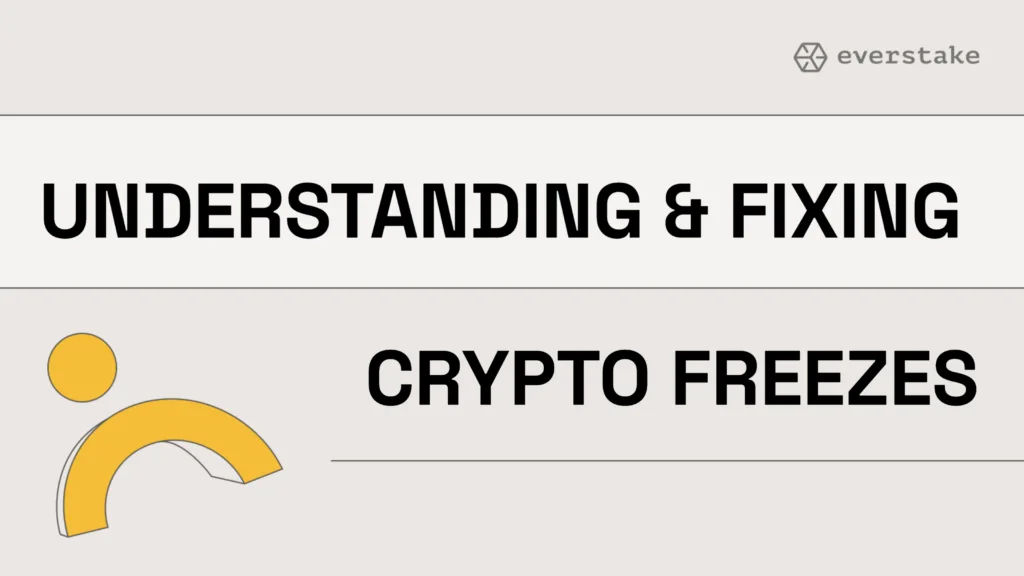
The ABCs of Crypto
Freezing Cryptocurrencies: All You Need to Know
Freezes exist for a reason, and knowing why (and how to thaw your funds) is crucial. This guide dives deep into the reasons behind frozen crypto, how to unfreeze it, and the future of frozen assets in the evolving crypto world.
APR 05, 2024
Table of Contents
What is Crypto Freeze?
The main reasons leading to freezing crypto
How can cryptocurrencies be frozen on a blockchain?
Does the immutability principle apply to frozen crypto assets?
Pros and Cons of Freezing Cryptocurrency
How to Unfreeze Cryptocurrency?
The Takeaway
Share with your network
If you regularly deal with crypto, you have definitely heard about frozen assets. This may seem contradictory to the decentralized nature of cryptocurrency, but it is a complex question with many implications.
In this article, we explore frozen assets, the ins and outs of frozen cryptocurrency, why it can happen, and how to prevent it. But first, let’s start with a question.
What is Crypto Freeze?
Cryptocurrency freezes are funds that are currently unavailable or temporarily blocked. Various factors, such as technological errors, security measures, discrepancies, investigations and regulatory compliance, can lead to these situations.
If exchanges or financial platforms suspect fraud or money laundering, they can freeze the funds in the account. In addition, it can be a preventive measure against possible security breaches or unauthorized access attempts.
Your funds can also be frozen if there are problems with the blockchain or the exchange. For example, in 2022, Binance temporarily suspended the issuance of Ethereum and ERC-20 tokens due to the upcoming upgrade of the Ethereum network.
If you notice that your funds are frozen, contact the relevant platform or service provider immediately to resolve the issue.
The main reasons leading to freezing crypto
Cryptocurrency can be frozen under various circumstances, which is determined by the legal and regulatory framework. Of course, a frozen account can be a frustrating experience, but understanding the causes and potential solutions can help you regain access to your assets.
Legal and compliance investigations
Regulatory authorities investigating fraud, money laundering or terrorist financing may freeze crypto-assets. This action complies with Know Your Customer (KYC) and Anti-Money Laundering (AML) regulations, which allow law enforcement to stop transactions and investigate suspicious activity.
For example, the Financial Action Task Force on Money Laundering (FATF) offers guidance on regulating cryptocurrencies, preventing illegal activity, and aiding investigations by freezing assets.
Court Orders and Judicial Procedures
Courts can issue orders to freeze crypto assets during disputes, lawsuits or criminal cases. This freeze prohibits the transfer or sale of assets pending the completion of legal cases or decisions.
Regulatory and legal measures
Regulatory authorities, such as tax or financial regulators, may freeze assets to ensure compliance by allowing appropriate investigations.
Security measures by crypto exchanges or wallet providers
Cryptocurrency exchanges or wallet providers may freeze assets if there is suspicion of unauthorized access, suspicious activity or a security breach in order to protect funds.
Depegging stablecoins
Platforms can freeze transactions with a stablecoin if it loses its peg to an underlying asset (such as the US dollar) to prevent further destabilization.
How can cryptocurrencies be frozen on a blockchain?
Depending on the conditions and context, different mechanisms can be used to freeze cryptocurrency. These could be centralized exchanges and wallets, legal and regulatory interventions, and smart contracts. Let’s take a closer look.
Centralized exchanges and wallets
Centralized platforms have the right to freeze assets under their control. Accounts or transactions may be suspended for security, legal or compliance reasons. This approach allows the platform to have centralized control over user funds, allowing for quick freezes, but raises concerns about central authority and trust.
Legislative and regulatory intervention
Legislators can freeze a certain type of cryptocurrency by imposing legal restrictions on financial institutions or exchanges. This approach ensures compliance with jurisdictional laws by freezing assets.
For example, China has taken strict measures against cryptocurrency trading and mining, significantly disrupting these activities within its jurisdiction.
Smart contracts
Smart contracts running on blockchain networks can include code-based freezing mechanisms. A smart contract can freeze assets based on pre-defined scenarios such as non-compliance or dispute resolution.
For example, some DeFi protocols often use smart contracts to allow asset freezing in the event of a loan default or contract breach. Smart contracts provide decentralization, automation, and transparency in crypto freezing.
Does the immutability principle apply to frozen crypto assets?
Blockchain immutability is a secure, immutable repository that protects and preserves the value of your frozen assets. This concept is important for financial applications that involve tokenized assets or cryptocurrencies.
If an asset is frozen and stored in the blockchain, its value and ownership remain the same. Immutability protects assets from unauthorized modification or counterfeiting and keeps an accurate transaction history.
Pros and Cons of Freezing Cryptocurrency
Let’s look at freezing assets from different angles. We have highlighted several main advantages and disadvantages of this process.

How to Unfreeze Cryptocurrency?
To regain access to your funds, it is important to find out the reason why your crypto account frozen. Contact the official support of your crypto platform (exchange or wallet provider) to determine the potential cause.
The platform may request additional information:
- KYC (Know Your Customer) Documentation. To verify your identity, you will need to provide an official ID, proof of address and any other required information.
- Explanation of activity. In case of suspicious activity, you will be asked to explain your transactions that are being audited.
- Compliance with legal requirements. It may be necessary to cooperate with the relevant authorities in cases involving legal issues.
After you submit the application, the platform will review your case. The review process may take some time depending on the situation’s complexity.
The Takeaway
The concept of freezing cryptocurrencies is a delicate issue that intersects with legal, regulatory and security issues. Yes, we are used to the decentralized spirit of cryptocurrencies, but the ability to freeze assets is a necessary measure, no matter what. Including protection of investors, compliance with regulatory requirements and termination of illegal financial activities.
It is important for users to understand the mechanisms and reasons for asset freezing in order to try to avoid it. It is also important to know how to manage the unfreeze process if their assets are frozen. As the crypto ecosystem continues to evolve, so will the strategies and policies for managing frozen assets.
Share with your network
Related Articles

The ABCs of Crypto
Crypto Validators Explained in Depth: The Core of Proof-of-Stake Networks
Validators are the core operators of Proof-of-Stake blockchains. This guide explains how they work, how they differ from delegators, and why they are critical to network security.
DEC 05, 2025

The ABCs of Crypto
Institutional vs Retail Staking: Key Differences
A clear breakdown of how institutions and individual users approach staking, and why their risks, requirements, and responsibilities differ.
DEC 01, 2025

The ABCs of Crypto
Institutional Staking Risks and How to Manage Them
From slashing to custody failures, institutional staking demands more than simple delegation. This guide breaks down the risks and the controls that matter.
NOV 25, 2025
Disclaimer
Everstake, Inc. or any of its affiliates is a software platform that provides infrastructure tools and resources for users but does not offer investment advice or investment opportunities, manage funds, facilitate collective investment schemes, provide financial services or take custody of, or otherwise hold or manage, customer assets. Everstake, Inc. or any of its affiliates does not conduct any independent diligence on or substantive review of any blockchain asset, digital currency, cryptocurrency or associated funds. Everstake, Inc. or any of its affiliates’s provision of technology services allowing a user to stake digital assets is not an endorsement or a recommendation of any digital assets by it. Users are fully and solely responsible for evaluating whether to stake digital assets.
Sign Up for
Our Newsletter
By submitting this form, you are acknowledging that you have read and agree to our Privacy Notice, which details how we collect and use your information.